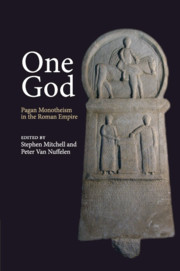Book contents
- Frontmatter
- Contents
- Preface and acknowledgements
- List of abbreviations
- 1 Introduction: the debate about pagan monotheism
- 2 Pagan monotheism as a religious phenomenon
- 3 Pagan ritual and monotheism
- 4 The case for pagan monotheism in Greek and Graeco-Roman antiquity
- 5 Monotheism between cult and politics: the themes of the ancient debate between pagan and Christian monotheism
- 6 The price of monotheism: some new observations on a current debate about late antiquity
- 7 Megatheism: the search for the almighty god and the competition of cults
- 8 Deus deum … summorum maximus (Apuleius): ritual expressions of distinction in the divine world in the imperial period
- 9 Further thoughts on the cult of Theos Hypsistos
- Bibliography
- General index
- Index of authors, works and citations
2 - Pagan monotheism as a religious phenomenon
Published online by Cambridge University Press: 20 May 2010
- Frontmatter
- Contents
- Preface and acknowledgements
- List of abbreviations
- 1 Introduction: the debate about pagan monotheism
- 2 Pagan monotheism as a religious phenomenon
- 3 Pagan ritual and monotheism
- 4 The case for pagan monotheism in Greek and Graeco-Roman antiquity
- 5 Monotheism between cult and politics: the themes of the ancient debate between pagan and Christian monotheism
- 6 The price of monotheism: some new observations on a current debate about late antiquity
- 7 Megatheism: the search for the almighty god and the competition of cults
- 8 Deus deum … summorum maximus (Apuleius): ritual expressions of distinction in the divine world in the imperial period
- 9 Further thoughts on the cult of Theos Hypsistos
- Bibliography
- General index
- Index of authors, works and citations
Summary
‘Pagan monotheism’ appears to be a paradox. Whereas paganism is intuitively seen as essentially polytheistic, the term ‘monotheism’ directs one's mind immediately to Christianity, Judaism and Islam, and not to the religions of Greece and Rome. The tension arising from the yoking of what seem to be two mutually exclusive terms expresses itself in three closely related problems. First, monotheism can be an ideologically loaded term, conveying the superiority of the Judaeo-Christian tradition for which it was coined. Consequently its application to Graeco-Roman religion may seriously hamper our understanding of this different religious tradition. Second, ‘pagan monotheism’ focuses on ideas about the godhead. It thus implies a theological and philosophical approach that may not be suited for the religions of antiquity, as these are often seen as essentially ritualistic. Third, as ‘pagan monotheism’ runs counter to our intuitive understanding of Greek and Roman religion, it raises the issue of the change that ‘paganism’ underwent in order to be able to accommodate monotheistic ideas.
The publication of the collection of essays on pagan monotheism in late antiquity by M. Frede and P. Athanassiadi in 1999 provided new impetus to the discussions about paganism and monotheism. Many of them end in a stalemate, with the critics of pagan monotheism dismissing the concept as inadequate while its supporters emphasise its importance. In this paper, which will discuss the three problems indicated, I hope to contribute to a fuller awareness of the issues involved when using the term ‘pagan monotheism’, and, if possible, to overcome the deadlock between supporters and critics.
- Type
- Chapter
- Information
- One GodPagan Monotheism in the Roman Empire, pp. 16 - 33Publisher: Cambridge University PressPrint publication year: 2010
- 4
- Cited by

